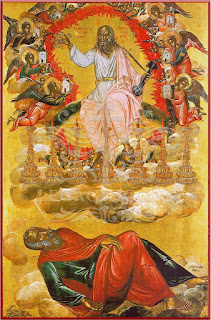Improving your relationship with God involves an ongoing transformative journey.
You need a life firmly based on faith in the Gospel teachings along with a constant effort to overcome your struggles to become like Christ. This path involves embracing the practices and principles rooted in the Orthodox tradition and following the example of Jesus. Here are some key points that can help you move closer to God.
1. Deepen you faith by Studying the teachings of Christ found in Gospel stories.
The necessary faith is developed through consistent study of the life and words of Jesus found in the New Testament. When you study them, read them as a story being told by eyewitnesses and about events that seem beyond reason. Not everything can be rationalized in what these writers experienced. In your study you will gain essential insights into the mystical nature of faith and develop a full understanding about Jesus’ character and virtues, particularly His meekness and humility. Christ, God born in flesh, is the fulfillment of the image that God has given all of us. Jesus being fully human, serves as an example for you to emulate as you navigate your own spiritual journey. As you read Scripture, you will encounter stories of God's magnificent works and witness His immense love revealed through His creation and the ultimate sacrifice of His Son, Jesus, on the Cross. Contemplating the depth of God's love and the selflessness of Christ's sacrifice, let this inspire you to respond with gratitude, awe, and a desire to return and imitate His love and humility in your own life.
2. Align your life with God’s commandments and the Holy Tradition of the Orthodox Church.
It is not enough to understand by reading Scripture what God expects of you. You must learn to become like Christ. You must learn to think like Him and act like Him. This may seem like an impossible task. This task is our purpose and the role of His Church is to help us. Your Orthodox faith places great importance on the Church as the Body of Christ and the sacramental life. You can organize your life so that you are actively participating in the sacraments, such as Holy Communion and Confession. Regular Church attendance with participation will strengthen your relationship through the Eucharist and the healing nature of Confession.. The sacraments are given to us through the work of the Hoy Spirit for the sole purpose to nourish your soul and facilitate your spiritual growth.
3. Acknowledge sin as the cause of your separation from God.
Understanding your sinful nature is probably the most important thing to focus on to strengthen your relationship with God. Reflect on the story of Adam and Eve and how their disobedience separated them from God. Your sinfulness is what separates you from God. Recognizing the dire consequences of your way of life helps cultivate a repentant heart to reconcile with God. Since God is mercy and has unbounded love, He will forgive you and help you grow closer to Him. This is what He desires for everyone. Think of sin as missing the mark, which is the meaning of the Greek word translated as sin. When you are unable to live by the ideals exemplified in Jesus, you are involved in sin, missing the mark, not living up to what He expects of you.
4. Cultivate a spirit of repentance.
We all miss the mark and the way to overcome each transgression in repentance. Repentance is the act of turning away from sinful behaviors and attitudes, and turning towards God with a contrite heart. By knowing that your sinful nature is what separates you from God, you will become motivated to repent. Repentance means changing your way of thinking to overcome your sinful tendencies and bad habits. Again this idea of change of mind is the meaning of the greek word translated as repentance. You first must acknowledge your shortcomings, then seeking God’s forgiveness and making a commitment to change, you will find that you grow closer to God. Everyday review your actions and seek repentance, ways to change how you think and act. Periodically participate in the Sacrament of Holy Confession, which cleans the slate with God, like in baptism, and you receive spiritual guidance from your spiritual father guided by the Holy Spirit. Also, as mentioned earlier, participate regularly in Holy Communion. In your daily prayers, another important Orthodox discipline, in addition to giving thanks and glorifying God, ask for the help of the Holly Spirit. Doing this you will open yourself gradually to the transformative work of God's grace, allowing Him in cooperation with your efforts, purify and renew your heart and give you needed strength to resist sinful tendencies. Jesus says that to see God requires a pure heart. This comes with a recognition of your sinfulness and repentance, a change of mind and action.
5. Strive to overcome your passions and bad habits.
As you are awakened to you weaknesses, you begin to understand the nature of your sinfulness. The Church Fathers call these passions. Without your effort to seek them these will remain hidden from you, buried in an insensitive conscience. You will discover that there are many things in your daily life you thought were normal are actually incongruent with a life in Christ. View these discoveries as positive, leading you closer to God. We are all sinners, but only a few of us make the effort to come closer to God. Your efforts must involve more than your self effort. You need a cooperative effort with the Holy Spirit, calling for divine help in uncovering and combating your undesirable habits. Gradually you will be freeing yourself from them. Every time you step into the Nave of the Church you are entering a sacred space filled with the direct presence of the Holy Spirit. Call on it for help. The Church is where we worship God and receive the mysteries, the purifying gifts of His Body and Blood through Holy Communion. Participate! Also, through the other spiritual disciplines taught by the Church: daily prayer, fasting and the cultivation of virtues. In this way you will become an active participant in your spiritual growth improving your relationship with God.
6. Improve your Personal discipline.
God will not work alone, but He works with you. He may awaken you to your need to act, but waits for you to respond. This means you must become intentional in all your choices, keeping God in mind, aligning your will with His principles and teachings, even when faced with challenges or temptations faced in daily life. This self-effort extends to various aspects of life, such as making time for pryer and worship, guarding your thoughts, and exercising self-control over all your actions. You make life intentional. The ascetic practices of fasting and daily prayer and regular worship help. By cultivating personal discipline, we enable ourselves to act in cooperation with God through the work of the Holy Spirit.
7. Tame your mind by practicing watchfulness.
Watchfulness involves being vigilant and mindful of your thoughts, desires, and actions. This involves recognizing before you act the subtle temptations that can lead you astray. This is work that takes place in your mind. It is also called guarding your heart, protecting it from distractions and worldly temptations that may lead you to act by your sinful tendencies. As you become more watchful you will develop a deeper sensitivity to the way excel forces work on you and how God can help. When you gain this ability you will avoid most temptations, allowing you to respond with obedience to God and align your will with His.
8. Learn the practice of Love
One of our modern day saints, Saint Porphyrios, taught that love is the means through which you unite with God and experience His presence in your life. He stressed that true love is expressed in humility, allowing you to genuinely care for others without seeking recognition or expecting anything in return. By humbling yourself and placing the needs of others above our own, you emulate the selfless love of Christ and deepen your relationship with God. He taught that through acts of love and compassion, you not only benefit others, but you will also experience spiritual healing and transformation. Love has the power to mend broken relationships, reconcile hearts, and restore harmony in your life. He emphasized the importance of cultivating unconditional love towards all people, regardless of their background, beliefs, or actions. He taught that love should be your default response, as it reflects the love of God Himself. By embracing this radical love, you will grow closer to God and experience His transformative grace.
Strengthening your relationship with God involves a lifelong journey requiring commitment and perseverance.
With faith in God, the life of Christ, His loving nature and His desire for us to become like him, you begin this journey. Awakening to how you frequently miss the mark in your daily life, and that these little sinful acts are what separates you from God, you can begin a new life of repentance. Consistently participating in the sacramental life of the Church, developing better personal discipline and watchfulness, and doing better at loving others, in cooperation with the work of the Holy Spirit you can progress, step-by-step, day-by-day. The Church is the body of Christ established to nurture along this path to becoming like Christ, a union with Him, Theosis.
Also, be sure to seek and follow the advice of a spiritual father. He will guide you in implementing these practices into your daily life.








